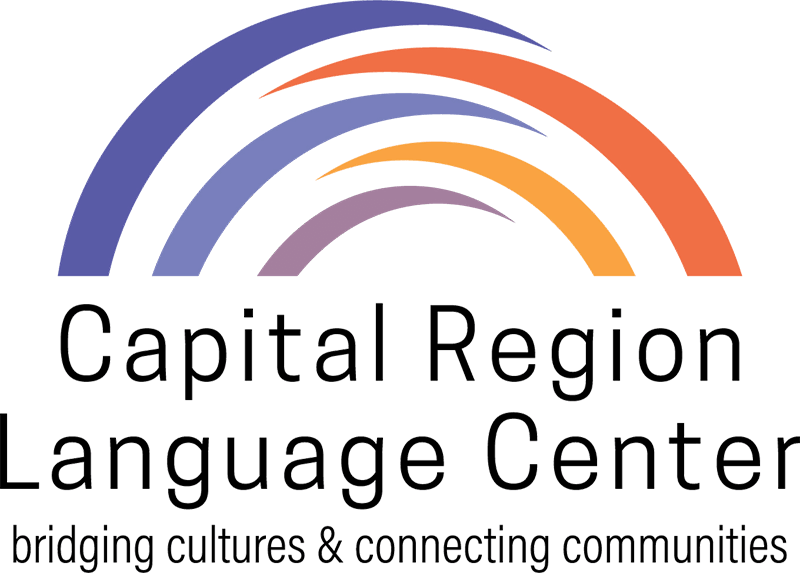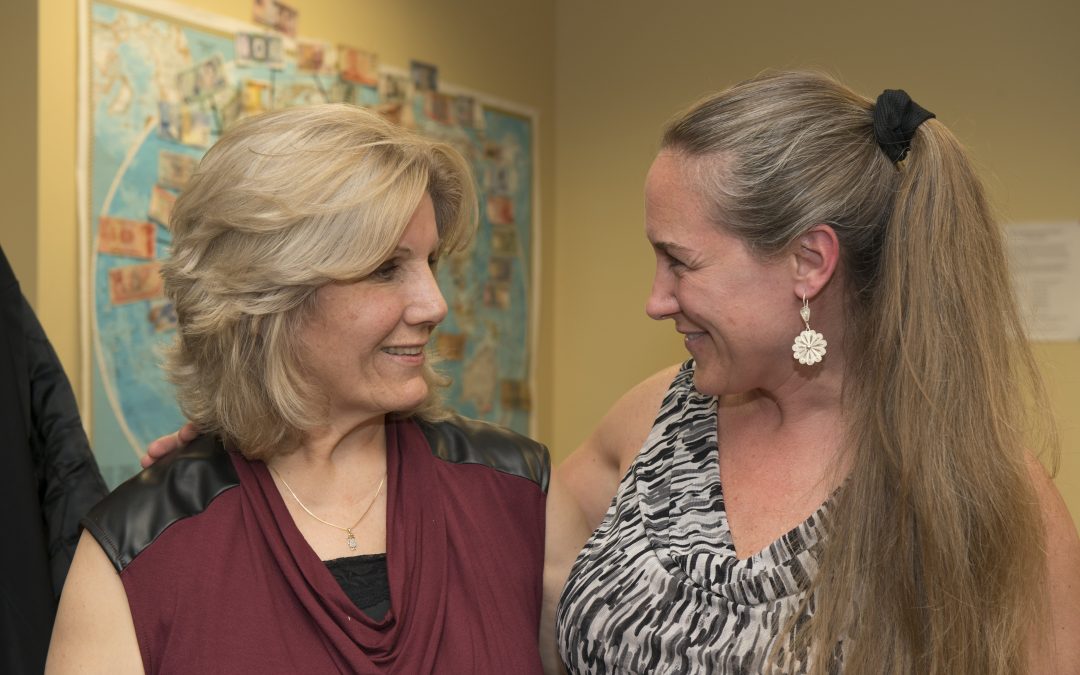As the Capital Region Language Center celebrates its 20th anniversary in 2023, Founder and Director Kim Andersen reflects on her journey, growing a local world language school. From a few weekly classes in her home to a 30-teacher team providing instruction in more than a dozen languages, she shares how the school has expanded to serve thousands of students, from toddlers at the local library to corporate employees.
Why did you start Las Mariposas Spanish School (the original school name translates to “the butterflies”)?
There were several reasons. First, I realized that having both parents working as full-time, public school teachers, with two toddlers and no family in the area, was not sustainable. I was talking with my cousin about it, and she had just signed up her four-year-old daughter for Spanish lessons. So, that planted a seed. Second, after moving to New York from Paraguay, I wanted to make sure I was speaking to my own children more in Spanish. I also saw a need for an adult program that was not semester-based and didn’t have lots of assessments. I started the school in a spare room in my home while finishing up high school teaching. Within a few months, I leased a small space in Ballston Spa.
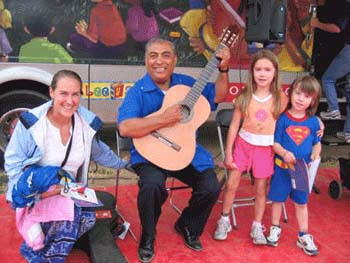
CRLC began as Las Mariposas Spanish School, with Kim Andersen (left), teaching from her home in Ballston Spa.
How did the school grow from Spanish to a dozen languages being offered?
My original plan was to teach Spanish until my younger child was in school full days. I figured I would return to teaching in public school in about four years. Once word got out that there was a small but growing program in Ballston Spa, we started getting calls asking for instruction in other languages. I found a woman who taught German and French, and then teachers for Chinese and Arabic classes.
Then, in 2006, my husband and I opened Mango Tree Imports, a fair trade retail store. That quickly attracted a diverse group of customers including people from abroad, parents who had adopted children from other countries, travel enthusiasts, culture-seekers, and language-lovers. One business really fed the other. By 2019, we had to close the store because the school had grown to a point that I needed to focus all my energy there.
One of the languages you offer is American Sign Language – how did that start?
We were getting requests for ASL around 2009 and discovered there were not a lot of opportunities to learn American Sign Language in the Capital Region. Our first ASL teacher, Kayani Ilse, still teaches with us. She really established the program, including ASL as an after school enrichment option.
We recently provided a new type of training, which I’d call “triage ASL.” We were contacted by Head Start teachers in Cambridge, through the LEAP Program. They wanted to use signing to help bridge language delays caused by young children wearing masks during Covid. And we are just starting a new ASL program for a group of teachers who serve adults with varying disabilities. ASL has really grown as a tool for communicating with non-verbal populations. We also teach American Sign Language at assisted living facilities, in addition to Spanish, French and other languages – the residents love learning to sign with each other!
What are some of your strongest memories over the past 20 years?
The students who were most impacted by their language classes are the stories that are most memorable. We had a student whose father was Syrian. Learning Arabic was a way to connect with her family and ethnicity. She took classes for more than 5 years. We have also taught many children who were adopted from China, Russia, Guatemala, and other countries. For them, language classes served as an important connection to their home countries and their identity. We led two different trips to Spanish-speaking countries, and the committed language students were able to use their new knowledge in real time.
I am also very proud of our role in helping bridge language and cultural gaps within families. We have helped bicultural couples learn their partner’s language, and we have helped their children learn the language to communicate with grandparents during visits or calls. One of the great things about kids is that they speak with native-like accents. That is really rewarding. We have also had basic remedial tutoring classes, so we have helped students get through their Spanish or French high school classes successfully. And of course all of the businesses we’ve worked with. Whether teaching English or another language, we have helped those employees be more productive and effective at their job. I could probably write a book of success stories!
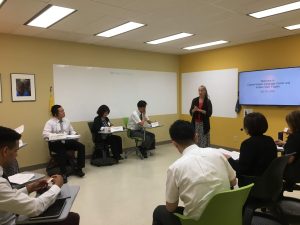
An adult class at CRLC’s Colonie location.
As the school has grown, have you seen the role of Capital Region Language Center change over the past 20 years?
Yes, it has! Here’s a general timeline:
- 2003-2006: Primarily taught Spanish to adults in children who were all paying their own way for classes
- 2006-2010: We began teaching additional languages: Arabic, Chinese, German, and French.
- 2010-2012: We hired the first full-time administrative assistant and opened a second location in Colonie while moving our Ballston Spa location to Malta and, a few years later, Saratoga.
- 2011: Established Colonie as our primary location
- 2012: We began partnering with state agencies, pharmaceutical companies and the College of Nanoscale Science and Engineering at SUNY Albany, largely providing English language for the business setting.
- 2012-2023: Since then, we have consistently been awarded state contracts for workshops and other language programs.
It seems like the biggest impact for our school was the growth of technology support companies for the region’s semiconductor chip-making industry. I’d say the commitment to growing computer chip technology here has been great for the work we do. We have partnered with some of the largest companies in the area, including CNSE, Samsung, TSMC, Schenectady International/SI Group and then more recently, with the video game developers. Sometimes it is providing English instruction, but increasingly, we are providing Chinese, Korean, Spanish and other languages that allow American workers to better communicate with partners in other countries or with their employees here in Albany.
Also, opening Empire State English in 2012 had a positive impact on CRLC. Our sister school offers a variety of English as a Second Language options, which in turn has attracted some terrific teachers.
Is there a language you haven’t been able to offer that you want to?
Occasionally we will have one-off requests for languages, and I wish we could help everyone. Right now, I would love to have a local German and Portuguese teacher for in-person classes (both classes are offered online). In the big picture, I think we cover a pretty impressive range of languages, we have very committed instructors and now, with video instruction, we are offering even more language and schedule options.
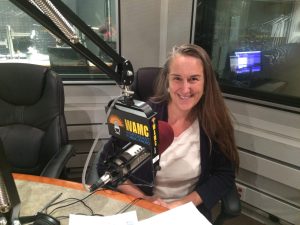
Kim Andersen being interviewed by WAMC, Northeast Public Radio.
Is the school affected by political or economic changes?
Yes. The combination of the Trump Administration restrictions on immigration, gun violence, a strong dollar, and the pandemic were very harmful – more for Empire State English than Capital Region Language Center. You cannot bring students from abroad to study here when flights are grounded and U.S. embassies around the world are closed. And parents in those countries saw high profile shootings and worried about sending their sons and daughters to America to study. The pandemic just slowed everything down – we’re still recovering, but hopefully the toughest years are behind us. At CRLC, Covid canceled contracted workshops, but the pivot to remote teaching has been a big positive because we can offer more languages and class times.
Share more about how Covid impacted you. You closed on Friday and were able to re-open on Monday as a fully online school?
It is a weekend I’ll never forget – and never want to go through again! Below is an email I sent on 3/12/2020 with the subject line: “bleach, Saturday night, and teaching“
Dear Teachers,
I know that this is a chaotic and stressful time for all of us. A few quick updates:
- There is a note up in each room about the bleach solution that can be used in classrooms. Please see the note at the end of this email as well.
- I have postponed Saturday night’s pizza/dessert party until further notice. Please tell your Thurs/Fri students if possible. I have also sent an email out to everyone who had RSVP’d and most of our current students.
- I am looking at some online, one-on-one and small group teaching options. I do not know if we will move in that direction. I need a few more days to think this through and do some additional research. We have a great internet connection here at the school and, should we give our students the option to be taught online, we would still be open for you to come and teach from here. This has not been mentioned to our students yet. Please send me your thoughts.
Thank you, Kim
That email went out on Friday, March 13, 2020, a week prior to New York State officially shutting down. On Saturday, I gave our teachers three options to meet online Sunday to get trained to teach virtually. By Sunday, I sent out an email announcing to all students that classes that week would be offered online. Our online teaching program was up and running on Monday, March 16 – I am so proud of that. At the time, I thought Covid would be temporary but consistency with learning a language is so important that I didn’t want our students to miss even a week of classes. I also knew that for some teachers, our program is their only livelihood. I didn’t want them to be without the teaching income. And let’s face it, rent and all of the other business expenses were still due, regardless of the pandemic.
I also think it was very good to have something for us all to focus on. We were busier than ever trying to keep all of the balls in the air while the news out of New York City and the rest of the world just got darker and darker. Since we are a non-essential business, we were not allowed to reopen for in-person classes until the end of October, 2020, but we didn’t really see a return to in-person teaching until sometime in 2021. A number of students and teachers have told us they are grateful that we just kept going. Everyone had something to look forward to. I am forever indebted to the team of teachers that we had at that time. Not one teacher (or student) quit or demanded a hiatus. It was truly incredible. I get choked up just thinking about it now.
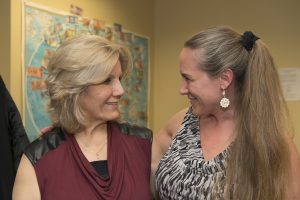
Kim Andersen (right) and long time Arabic instructor, Nassra Hamid.
Did that experience change your business model forever?
It did. Remote teaching was not new to all of us. I had delivered Spanish lessons via Skype beginning in 2006. Our German teacher moved away a couple of years before the pandemic and had been using Zoom for a long time. We had an American Sign Language student in Vermont and a French student in Massachusetts that we had taught online.
However, before Covid, I heard a hard “no” repeatedly when we talked about remote teaching – until we didn’t have a choice. But we were not the only ones who adapted. Our corporate clients, some of the state agencies, and our students were willing to work with us. While the silver lining certainly does not offset the global devastation, we were forced to learn to use tools that had always been there.
You speak so highly of your teachers. How do you find them? And how do you know if a teacher will be a good fit for the school?
Lots of times we find teachers via word of mouth. Our teachers are very good about sharing with others in their community, and they send teachers our way. I think that is because what we do is unique. Teachers can provide us with their availability, and we work with it. If they are only available certain nights of the week or a portion of the year, that’s ok.
After 20 years, I know a teacher who is a good fit has the following four characteristics:
-
- Native or near native speaker of the language they teach.
- Prior experience. They did not need to be a language teacher per se, as teaching skills are transferable.
- Flexibility and the desire to try new things. This can be a dealbreaker, and teachers generally know or discover that out about themselves during our initial call, before we even get to the interview.
- It may be an overused word, but passion. As an employer, you either feel it or you don’t. If teaching is just a job for you, our school isn’t the right “culture” fit. Our teachers absolutely LOVE what they do!
It is also important to note that we are the first job in the U.S. for many of our teachers. I am so proud to provide a new professional opportunity for someone who is an immigrant to the Capital Region.
After 20 years, why do you continue to do what you do?
The end goal is for communication to lead to peace. Our little school won’t spark global reconciliation, but I do think any conflict is related to a lack of communication: physical, cultural, verbal – if you don’t have the ability to communicate, how can people get along?
So, I like to think we are helping bridge those gaps. We’re helping local companies boost productivity, which helps our economy. We’re building a community, which makes where we live a better place. That’s at the heart of why I keep growing Capital Region Language Center. To enhance communication. I don’t think enough is being done to teach acceptance of others.
The one thing I can say with certainty after 20 years is that people love to share their stories and culture – and there are not enough places in our society to do that. We are now seeing a heightened awareness of DEI (diversity, equity and inclusion), but I’d argue we’ve been working in that space since we started. Communication and understanding is a huge part of the DEI movement, but a lot of people have been involved in this role, in particular educators, for a really long time. And anyone who has passed through our schools – staff, instructors or students – they have that understanding.
Are you finding more companies are seeking you out to help with DEI initiatives?
While we can always help with translation and interpretation, the key service we provide is language training. We have seen something as simple as a two hour “refresher” on English grammar really improve email productivity. Or, in the case of a video game developer, we taught the Korean language, as well as customs and travel etiquette, so the American team could communicate with Korean colleagues, on calls, via email, and when they visited Korea.
We do larger workshops on a variety of communication topics, but one of the ways I think we have been very effective is working one-on-one with a specific employee. Maybe someone can write English well, but struggles to understand idioms or figures of speech and doesn’t speak up in meetings. Or, maybe someone speaks Spanish, but their writing aptitude is hurting them. Those are quick fixes because our teachers will zero in on the skills an employee needs to be successful. Over a series of one-on-one video sessions, we see drastic improvements and impressive results.
What else do you want to share?
These language schools are not my schools. Yes, on paper I founded and own them, but they are a tapestry, woven by every staff member and student that has ever contacted us. Students who have attended and teachers on our payroll have had the biggest impact of course, but every call, every open house attendee, every interview that didn’t lead to a job, has been another connection to this world of communication that we are engrossed in.
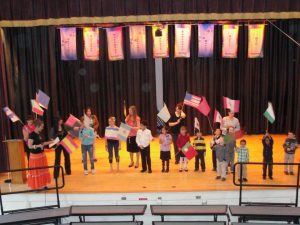
Children share what they learned in different language classes during a CRLC event.
What would you like to say to all your students over the years?
Thank you for trusting us to provide the best language teaching that we can. I hope that you or your children were somehow shaped positively by your time with us. Perhaps it has opened up new opportunities, laid the groundwork for a new position, or contributed to a travel experience. A school isn’t a school without students!
On that note, we are planning a 20th anniversary celebration this fall. We want to invite as many former students as we can, so we ask that if you ever took a class or worked with us, please email us at: info@crlcalbany.org so we can invite you to the party!
